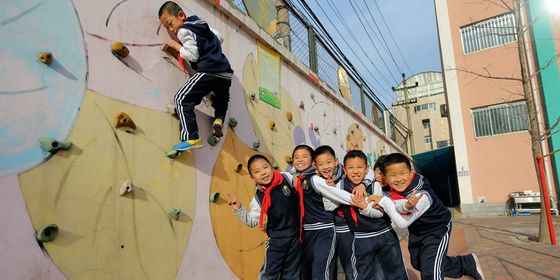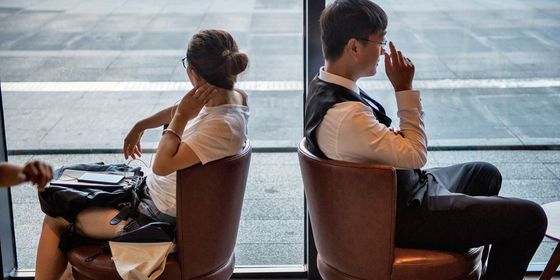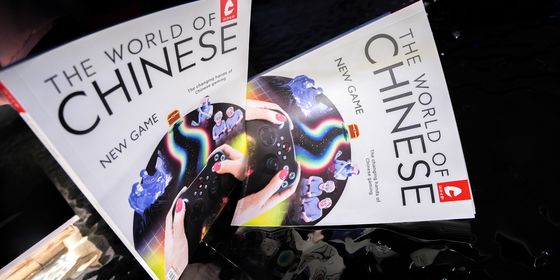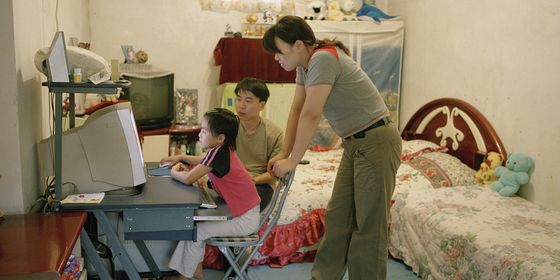With “wonder dads” becoming the new face of Chinese families, many fear extra pressures on already fragile fathers
There was no doubt that 21-year-old “Katie” (pseudonym) was the apple of her father’s eye. No one else would dream of touching the provincial party secretary—let alone playing with the leader’s “ears that catch the wind,” as Katie teasingly described them.
Their tenderhearted exchanges in a restaurant elevator in Katie’s hometown challenged old-fashioned values as much as they embraced familial ones—when the doors opened, to the public eye, both jumped back into their formal roles. For centuries, Confucian and later Manchu mores dictated parent-child relationships. The quintessential Chinese father was the benevolent patriarch, provider, and head of the household; austere disciplinarian tendencies ensured that “strict father and benevolent mother” (严父慈母) was the largely accepted family model.
While far from extinct, this rigid role has several new challengers in today’s more pluralist environment. For many modern fathers, it is not enough to merely bring home the bacon. They also need to be emotionally—and literally—available: the type of father who gets a “#1 Dad” coffee mug for Father’s Day (and deserves it).
But this expanded ideal is often accompanied by increased obligations, financial and otherwise, meaning these new dads are not just “better,” but oftentimes more insecure. Beijinger Mr. Mao fears that he falls short of being the perfect father to his 4-year-old son. The ideal dad should “provide his children with the most resources he can, as well as invest as much time and energy as he can into the children and the home,” the 38-year-old father told TWOC.
Mao is not alone in his thinking: A fatherhood study conducted by PR firm J. Walter Thompson Intelligence (JWT) found that 60 percent of Chinese fathers did not feel they had enough time to spend with their children, while 95 percent had difficulties balancing careers with home life. Hoping to bolster values that encourage couples to have a second child, several provincial governments have offered benefits to new fathers: In 2017, Jiangsu followed the footsteps of Gansu, Henan, and Yunnan provinces by establishing a 30-day paternity leave.
Bucking familiar trends, the JWT study also revealed that a significant percentage (48) of fathers believed that helping with homework was their primary responsibility, just ahead of entertaining and playing with their children (though only 16 percent thought they should take on diaper duties).
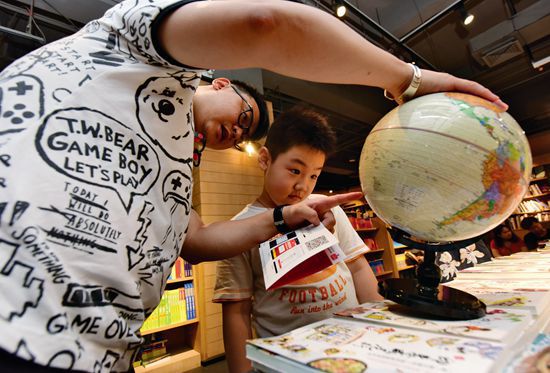
A father tries to teach his son geography at a bookstore in Xi’an (VCG)
Companies have taken notice of middle-class daddy issues and are bent on turning them into a consumerist trend. In 2016, Bayer started a campaign for Elevit prenatal vitamins in China, in which fathers heard their unborns’ heartbeats for the first time; the ad quickly became one of the top trending topics on Weibo. In July, BMW released “Wonder Dads,” a 15-minute video featuring movie stars Mark Zhao and Song Jia, in which a young boy imagines his reliable, lower-level executive Shanghai father as a superhero (driving a BMW X3, naturally).
But it was Hunan Television’s 2013 reality hit, “Where Are We Going, Dad?” (《爸爸去哪儿?》), that catapulted modern fathers into the mainstream. Featuring celebrity dads taking their preschool-aged children on countryside adventures, the program quickly became one of China’s most popular shows, with 75 million viewers per episode, and support from China Daily for promoting a “return to family values.”
While fatherhood has been in flux for over a century, it was during the reform era that the concept began to change dramatically, according to Xuan Li, Assistant Professor of Psychology at the Shanghai branch of New York University.
In post-1980s China, the 拼爹 (pīndiē) phenomenon—meaning “compete using father,” the practice of leveraging a parent’s status to improve one’s own—proliferated. Many privileged youngsters launched lucrative careers not on their own merits, but rather the reputation, connections, and capital of their fathers. This created immense pressure for Chinese men, in particular, to ensure opportunities for not only themselves, but also their offspring in China’s increasingly cutthroat capitalist economy.
Additionally, as socialist influences waned, women found themselves increasingly forced out of the workplace and back into home. While still the largest in the world, China’s female workforce is steadily declining—from 73 percent in 1990 to 61 percent in 2017. Subsequently, today’s fathers “feel more pressured in the rat race to provide financial, social, and cultural capital for their children,” Xuan told TWOC, which was not the case when women were co-breadwinners.
Reform led to not only economic, but also cultural changes. Western media provided new examples of how fathers could engage with their children. Mao says that his parenting style is quite different from that of his father: “For people born in the 1970s and 1980s, we have felt strong influence from Western culture. Now, on top of being a traditional father, we should also be friends with our children.”
Xuan agrees that Western media has introduced new models for parent-child engagement which focus on “greater warmth, affection, and equality between parent and child.” In her research, she also states that the impact of the one-child policy, which accompanied the economic reforms, cannot be ignored. As parents focused on the well-being of their only child, some began to criticize traditional parenting models, including Confucian austerity, in favor of emotional connections with their children.
Others, though, have bunkered down deeper into Confucian tradition, earning the title of “tiger” or “wolf fathers.” Chinese media have showcased examples such as Zhang Yu, a Sichuan father who forced his 6-year-old son to conduct intense training exercises every day, as well as down two bottles of beer, and Nanjing’s He Liesheng, who trained his 9-year-old son to climb Mount Fuji and singlehandedly fly an airplane. Meanwhile, 7-year-old piano prodigy Chen Anke’s success is often attributed to her father’s “tiger” tendencies.
On the other hand, China has a substantial male population without the financial and social resources, let alone time, to achieve the elusive “wonder dad” status. Xuan’s research notes that a “father’s education level is a significant determinant of [his] expression of warmth and affection.” In a countryside littered with tens of millions of “left-behind children,” whose parents migrated to work full-time in urban centers, new fatherhood models create another set of unattainable values that exacerbate the urban-rural divides in wealth and culture.
In the meantime, middle-class Chinese fathers are playing a game of constant catch-up to meet ever-increasing standards depicted by an oftentimes-unrealistic media. In August, Mercedes debuted its latest advertisement depicting a father rushing home from work to give his young son a toy bear. It was a campaign played relentlessly in elevators in office buildings across China’s business districts, to an audience of stressed white-collar workers unlikely to have enjoyed such magically materialist childhoods themselves—yet still expected to provide one.
Daddy Issues is a story from our issue, “The Masculinity Issue.” To read the entire issue, become a subscriber and receive the full magazine.







